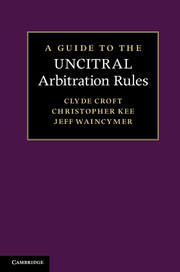Book contents
- Frontmatter
- Contents
- Preface
- Foreword
- Introduction
- Section I Introductory rules
- Section II Composition of the arbitral tribunal
- Section III Arbitral proceedings
- Section IV The award
- APPENDIX 1 United Nations Commission on International Trade Law (UNCITRAL)
- APPENDIX 2 Recommendations to assist arbitral institutions and other interested bodies with regard to arbitration under the UNCITRAL Arbitration Rules as revised in 2010
- Index
Preface
Published online by Cambridge University Press: 05 May 2013
- Frontmatter
- Contents
- Preface
- Foreword
- Introduction
- Section I Introductory rules
- Section II Composition of the arbitral tribunal
- Section III Arbitral proceedings
- Section IV The award
- APPENDIX 1 United Nations Commission on International Trade Law (UNCITRAL)
- APPENDIX 2 Recommendations to assist arbitral institutions and other interested bodies with regard to arbitration under the UNCITRAL Arbitration Rules as revised in 2010
- Index
Summary
Preface
The work of the United Nations and its agency the United Nations Commission on International Trade Law (UNCITRAL) has been critical to the development of international commercial arbitration and, with increasing importance in more recent times, investor–state arbitration. Of particular importance in this respect are the New York Convention on the Recognition and Enforcement of Foreign Arbitral Awards (1958), the UNCITRAL Model Law on International Commercial Arbitration (1985) and its subsequent revision (2006), and the UNCITRAL Arbitration Rules (1976) with their subsequent revision in the form of the UNCITRAL Arbitration Rules (2010). The 2010 Rules contain significant revisions and changes to the 1976 Rules.
The UNCITRAL Arbitration Rules have for more than thirty years provided a set of arbitration rules available for ad hoc arbitrations. They have also provided something in the nature of an international consensus on arbitration practice which serves as a datum from which parties may tailor rules to suit their needs in arbitration agreements, and also serves arbitral institutions in the development of their own arbitration rules. The UNCITRAL Arbitration Rules have also assumed particular significance in recent years with the growth in the number of bilateral investment treaties (BITs) – in which these Rules are generally adopted for the purpose of the BIT arbitration provisions.
- Type
- Chapter
- Information
- A Guide to the UNCITRAL Arbitration Rules , pp. xvii - xxPublisher: Cambridge University PressPrint publication year: 2013

